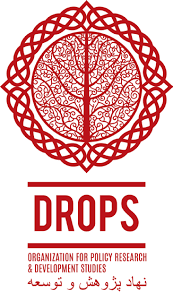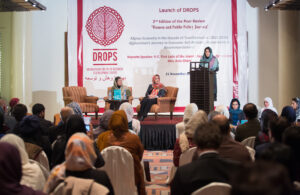 While Afghanistan’s food crisis is the most pressing issue for women overall, the rollback of rights, particularly for those between the ages of 18-25, remains a serious concern due to the direct, daily impact on their lives, says a new survey from the Organization for Policy Research and Development Studies (DROPS).
While Afghanistan’s food crisis is the most pressing issue for women overall, the rollback of rights, particularly for those between the ages of 18-25, remains a serious concern due to the direct, daily impact on their lives, says a new survey from the Organization for Policy Research and Development Studies (DROPS).
In May 2022, for the first time since the August 2021Taliban takeover, 532 women in nine Afghan provinces were surveyed to provide their views on the humanitarian crises and current conditions in the country. The policy brief, “Gender Analysis of the Situation in Afghanistan,” is published in collaboration with the Working Group on Women Peace and Security. It outlines the key findings of DROPS’ field work (funded by the National Endowment for Democracy) on women’s rights issues and lists several recommendations to the international community:
- The international community must condition any further engagement or dialogue with the Taliban on the regime meeting human rights standards, including by reversing recent decrees. This expectation must be consistently and publicly articulated and backed up in policy. The international community must not hold the Taliban to a lower standard and ensure accountability for violating human rights obligations. Given that international efforts to encourage dialogue so far have not resulted in any change in the Taliban’s policies, Member States must use all available tools to signal that the Taliban’s behavior does not have their support.
 The international community must ensure there is full political support as well as adequate resources to bolster gender-responsive human rights monitoring and reporting mechanisms, including UNAMA and the Special Rapporteur for Human Rights in Afghanistan, as well as all additional efforts to create independent mechanisms that can support accountability.
The international community must ensure there is full political support as well as adequate resources to bolster gender-responsive human rights monitoring and reporting mechanisms, including UNAMA and the Special Rapporteur for Human Rights in Afghanistan, as well as all additional efforts to create independent mechanisms that can support accountability.- The sanctions imposed by the UN Security Council must be carefully monitored and be fully re-imposed and strengthened if the restrictions on women’s rights continue. The exemptions to specific Taliban leaders from the 1988 sanctions regime were made to permit them to travel for peace talks prior to August 2021 and have been extended at regular intervals since then to facilitate continued dialogue……
- As the situation continues to deteriorate, UNAMA should ensure its actions, reporting and public communication align with its mandate to support the people of Afghanistan. An important way to achieve this is to ensure that all public communication reflects the realities on the ground and refrains from legitimizing the Taliban’s policies or actions in the name of dialogue.
Reflections from Afghan Women: The Consequences of an Unsuccessful Peace Process https://t.co/oqNzeBAEVG
— Democracy Digest (@demdigest) June 23, 2022
USIP hosts a discussion with leading Afghan women experts and activists who will talk about their journey from Afghanistan to the United States, the conditions currently facing Afghan women, and what the United States and international community can do to support a more inclusive and sustainable peace in Afghanistan. Join the conversation on Twitter using #AfghanWomen.
Speakers
Palwasha Hassan, Senior Fellow, Institute for Women, Peace and Security, Georgetown University
Lima Ahmad, Doctoral Candidate, Fletcher School of Law and Diplomacy, Tufts University
Muzhgan Sadat, Gender Activist and Novelist
Belquis Ahmadi, moderator, Senior Program Officer, U.S Institute of Peace







